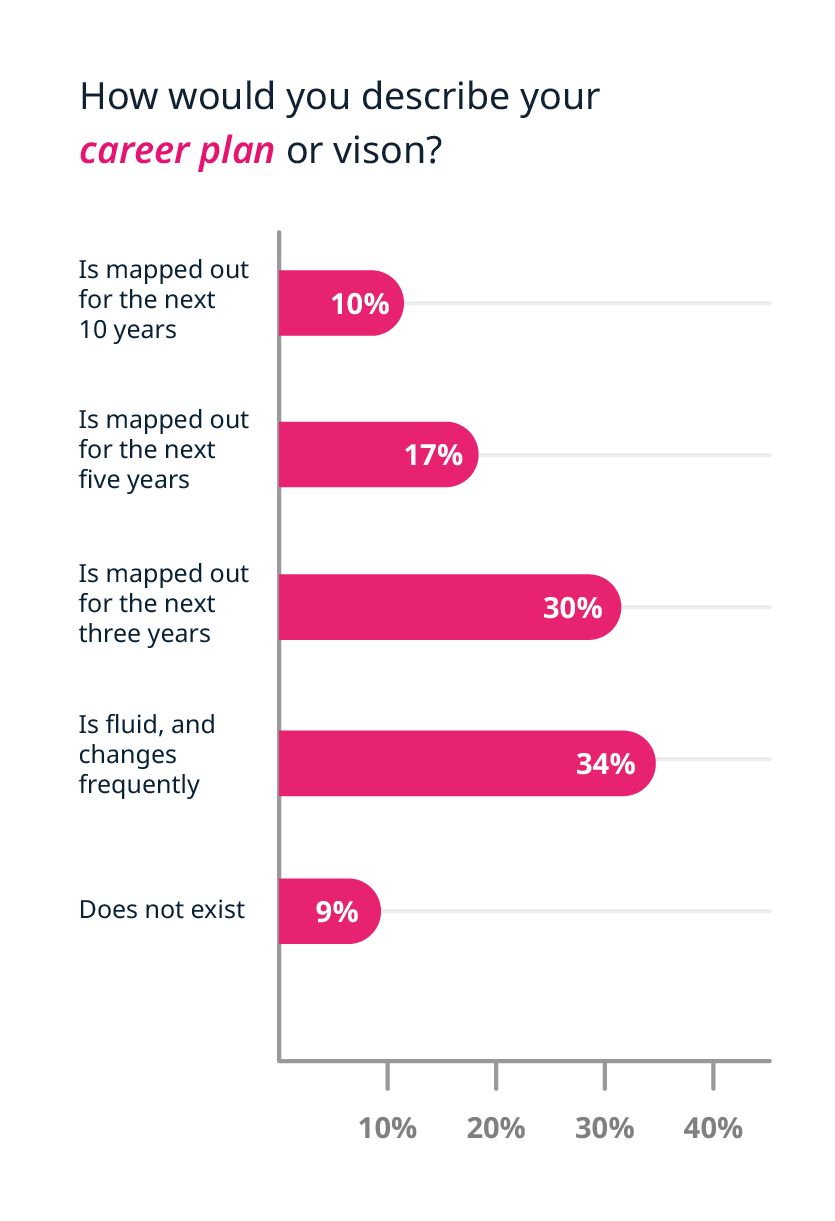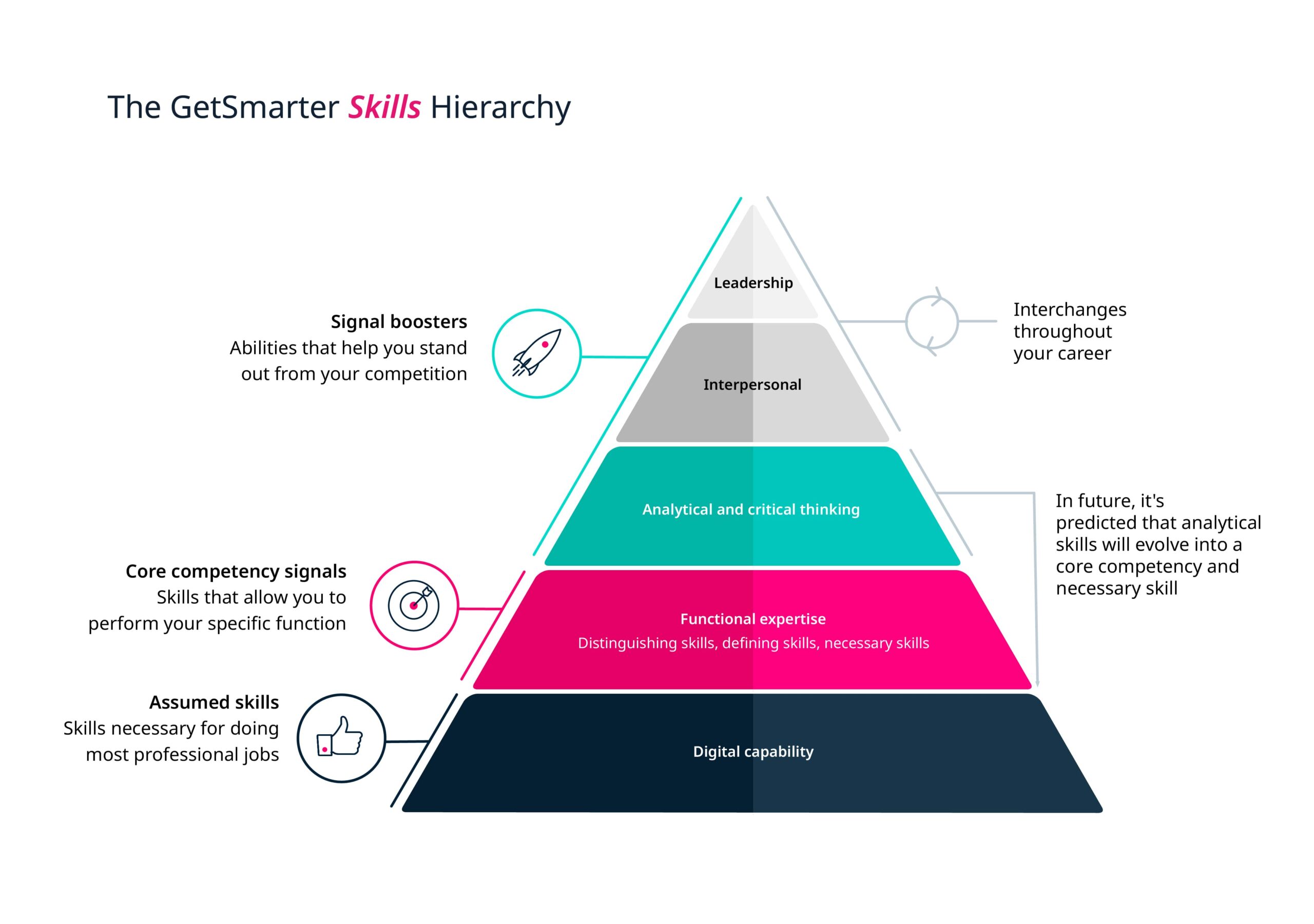The Great Career Reset: Pivoting From a Career Plan to a Skills Plan
Unprecedented shifts brought on by COVID-19 have driven many professionals out of their comfort zones and caused them to interrogate what’s most important in their careers. Today, a growing number of people are looking for a way to balance the need for stability with their desire for a more agile career that accommodates their changing needs and provides a greater sense of purpose.1
To investigate how to best serve professionals’ development, GetSmarter, a 2U, Inc. brand, conducted a survey of 648 people from around the globe. The responses show that the COVID-19 crisis – while the cause of immense distress – has also accelerated certain career trends, with an increasing number of professionals rethinking their approach to growth. Now, more than ever, people are prioritizing upskilling as a way to adapt for a post-pandemic future.
Transforming careers in the wake of COVID-19
For professionals around the world, retrenchment and furloughing have been very real and difficult parts of the COVID-19 crisis.2 Many have been forced to re-enter the job market as their companies have struggled to survive or have closed completely. That said, even those who haven’t lost their jobs are reassessing how long they want to stay in their current roles. In fact, more than a third of GetSmarter’s millennial and Generation Z survey respondents say they’re “very likely” to change jobs in the next 12 months alone. Perhaps even more noteworthy, 63% of Generation Z and 54% of millennials say they’re either “somewhat likely” or “very likely” to change entire professions in the same time frame.
Whether career change has been voluntary or not, an increasingly active labor market has highlighted the need for upskilling as a way to adapt to an uncertain landscape. Professionals who are changing jobs need to bolster their CVs in order to compete. But more significantly, the growing trend towards career reinvention means that more professionals may need to reskill completely.
Rethinking career trajectory
Due to the changes brought on by the pandemic, more people have realized that there isn’t a single way of experiencing a career and, in turn, are reimagining what their professional lives could look like in the long term. This has amplified the trend towards a less linear career path. According to GetSmarter’s research, the majority of respondents have much shorter and more fluid career roadmaps post-COVID-19, with most people planning no more than three years into the future.

Sidestepping the traditional career path, professionals are being driven to look more broadly at the directions their careers could take given today’s increasingly complex and turbulent work environment. Exacerbated by the pandemic, there are higher chances of job loss and fewer opportunities for vertical mobility.3 As a result, the future career trajectory for many may likely be made up of a range of jobs, including working with employers, engaging in the collaborative economy, and self-employment. The emergence of hybrid jobs also means that the nature of specific careers could be upended.4
As career change expert Herminia Ibarra says:5
“When you don’t know what the future will bring, or when the path you thought you were on takes an unexpected turn, it makes sense to pursue a diverse portfolio of options rather than just sticking single-mindedly to one.”
Developing a skills plan
As roles become more fluid, the concept of traditional career development plans also becomes increasingly outdated. Instead, professionals are focusing on creating a tool kit of transferable skills. These skills can be used as building blocks that can be reconfigured in various contexts throughout their professional lives – much like how LEGO pieces can fit together to create any number of constructions.
And while technical skills remain important, there’s growing acknowledgement that they require the support of a broader tool kit of leadership and soft skills,6 such as communication and critical thinking.7 This is reflected in GetSmarter’s past research, where respondents forecasted that critical thinking (31%) and leadership skills (26%) will hold greater importance than technical (17%) or digital (11%) capabilities in the long term.8 GetSmarter’s latest findings support this: a third of respondents expect leadership and soft skills to be by far the most important competencies in 2021.
This has created a new hierarchy of skills, where digital literacy is assumed, and leadership, critical thinking, and interpersonal skills act as signal boosters to employers looking for agile employees who can take on various roles.

As uncertainty opens up the doors for more permanent change, professionals have the power to reshape their careers by building up a portfolio of skills. Whether it’s prioritizing a work-life balance or pivoting to a role that offers more fulfillment, there’s been a profound shift in what’s seen as possible. One thing is certain: for those who want to succeed in the long term, regardless of external disruptions, lifelong learning is essential.
What’s your next career move? The GetSmarter Career Navigator tool provides upskilling guidance and insights to help you plan for the future you want.
Plan your next steps using the Career Navigator tool.
Stay competent, confident, and informed
Sign up to our monthly newsletter to receive the latest course information, expertise from renowned thought leaders, and a summary of our most recent blog articles.
- 1 Savage, M. (Nov, 2020). ‘Has the meaning of work changed forever?’. Retrieved from BBC.
- 2 Lund, S. et al. (Apr, 2020). ‘Lives and livelihoods: Assessing the near-term impact of COVID-19 on US workers’. Retrieved from McKinsey.
- 3 (Sep, 2020). ‘The Future of Work Is Here’. Retrieved from GetSmarter.
- 4 Martin, N. (Aug, 2019). ‘Three ways employers can prepare for the future of work’. Retrieved from Virgin.
- 5 Ibarra, H. (Apr, 2020). ‘Reinventing your career in the time of coronavirus’. Retrieved from Harvard Business Review.
- 6 Anderson, B. (Jan, 2020). ‘The most in-demand hard and soft skills of 2020’. Retrieved from LinkedIn.
- 7 Bughin, J. et al. (May, 2018). ‘Skill shift: Automation and the future of the workforce’. Retrieved from McKinsey.
- 8 (Sep, 2020). ‘The Future of Work is Here’. Retrieved from GetSmarter.